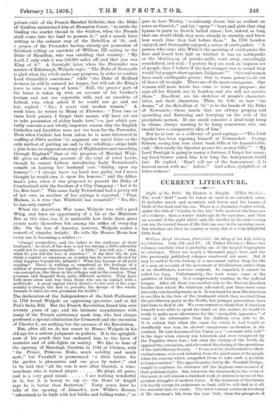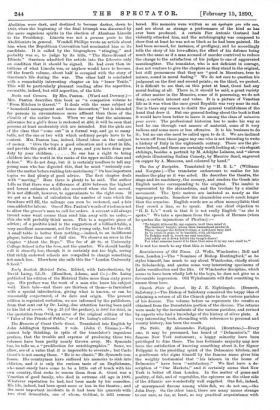William Lloyd Garrison, 1805-1879: the Story of his Life, told
by his Children. Vols. III. and IV. (T. Fisher Unwin.)—These two volumes conclude what is probably one of the largest biographies in existence. There are nearly a thousand pages here, and the two previously published volumes numbered yet more. But it may be said to be the history of a movement rather than the life of a man, an account of the movement of Abolitionism rather than of an Abolitionist, however eminent. So regarded, it cannot be called too long. Unfortunately, the work wants some of the qualities of history. It is conspicuously wanting in the judicial temper. After all, there was another side to the Slavery Question besides that which Mr. Garrison advocated, and there were some sincerely convinced persons on it. It was hard for men like Garrison to see-this in the face of the treatment which they received from the pro-Slavery party in the North, but younger generations have had time to find it out. We even venture to think that if Garrison himself were alive to speak his mind on the matter, he would be ready to make more allowances for the." invincible ignorance" of some of his adversaries than his children seem able to do. It is certain that when the cause for which he had fought so steadfastly was won, he showed conspicuous moderation in his conduct. He had denounced the Union as a "covenant with hell" in the days when slavery was tolerated, and even recognised by the Fugitive Slave Law ; but after the victory of the North; he opposed the extremists, and advocated the closing of the operations of the Anti-Slavery Society. "It was not for Abolitionists to affect exclusiveness, or to seek isolation from the great mass of the people when the reasons which compelled them to take such a position no longer existed." The opposite party, led by Mr. Wendell Philips, sought to continue its existence till the Negroes were assured of their political rights. But, whatever the drawbacks to the value of thia work, it will remain a standard work of reference on one of the greatest struggles of modern times. If the historian of the future will hardly accept its judgments as final, still he will find in it all the material that he wants. The third volume carries on the story of Mr. Garrison's life from the year 1841, when the prospects of
Abolition were dark, and destined to become darker, down to 1860, when the beginning of the final triumph was discerned by the more sagacious spirits in the election of Abraham Lincoln to the Presidency. Lincoln was not a persona grata to the Abolitionists in general. Wendell Phillips wrote an article about him when the Republican Convention had nominated him as its candidate. It is called by the biographers " stinging," and probably was so, to judge by its title, "The Slave-Hound of Illinois." Garrison admitted the article into the Liberator only on condition that it should be signed. He had even then in- tuitions of what Lincoln was, or anyhow would have to become. Of the fourth volume, about half is occupied with the story of Garrison's life during the war. The other half is concluded with a remarkably interesting chapter on his "Inner Traits." This will be particularly pleasant reading after the asperities, excusable, indeed, but still asperities, of the Life.



































 Previous page
Previous page